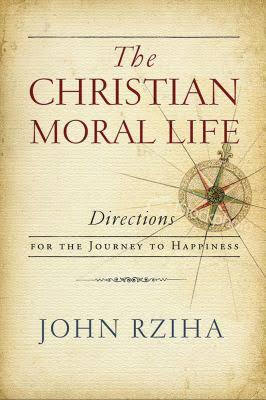Book Review
The Christian Moral Life:
Directions For The Journey To Happiness
by John Rziha
University Of Notre Dame Press (30 june 2017)
ISBN: 978-0268101817 (Also available on
Kindle)
 This
is the ideal book for those of us who are seeking to deepen our
understanding of Catholic moral theology but who wish to avoid the
technical jargon that is often found in such works. The pursuit of the
moral life is rather like taking a journey, says the author. We have to
know where we are, we have to know where we are going and we need to know
how to get there. In moral theology, we have to know that we are made in
the image of God, that our destiny is union with God and we need to make
the good choices to get there.
This
is the ideal book for those of us who are seeking to deepen our
understanding of Catholic moral theology but who wish to avoid the
technical jargon that is often found in such works. The pursuit of the
moral life is rather like taking a journey, says the author. We have to
know where we are, we have to know where we are going and we need to know
how to get there. In moral theology, we have to know that we are made in
the image of God, that our destiny is union with God and we need to make
the good choices to get there.
We are, says the author, called to participate in the divine nature through grace. The book thus covers the natural and the supernatural: the role of law, the virtues and the gifts of the Holy Spirit in transforming us into friends of God.
The different types of law are discussed: the Eternal law, the Natural law and the human law. Natural law refers to reason's participation in the Eternal law. Because we are created by a wise God, we are able to determine that some acts lead to true happiness and some do not. Because of the Natural law, all humans have access to some moral truth even without Divine law.
Throughout the text, the importance of the virtues is noted. On the natural level, there is the natural inclination to know, love and seek the bodily good. A virtue is a good habit just as an evil habit is a vice. A virtue causes acts that lead to God. A vice is a habit that contradicts our inclination to know and love God and others. I am reminded that in Catholic thinking, our inclinations are basically good. How different this is to classical Protestantism.
Virtues can be divided into acquired and infused. Acquired virtues develop from human nature. Infused virtues are gifts from God. Again, we cannot help but note that Catholic moral thinking is at home both in the natural and the supernatural.
How does this compare with what is normally taught in secular ethics courses? The author notes that Kantian ethics is deficient because it is only one element of the moral life, and deontological systems tend to neglect the role of grace, natural inclinations to an end, virtue and happiness. Utilitarianism also falls short because it neglects the role of law and the necessity of the virtues. It also neglects the truth that some actions are always evil and they cannot be done to bring a greater good.
What about freedom? Authentic freedom, says the author, is the freedom to do great things, to fulfill our natural inclination to be happy. It is not the freedom to do what we want to do. Unfortunately, the secularists have no understanding of happiness, just as they do not understand what freedom is. Happiness, says the author, is the act of contemplating the good that we know and love. The concept of happiness is easy to grasp. To acquire the virtues necessary to actually know and love the highest good requires a lifetime of hard work!
What makes this book really exciting is in its achievement in making a Thomistic text profoundly personalistic.
Reviewed by Dr Pravin Thevathasan
